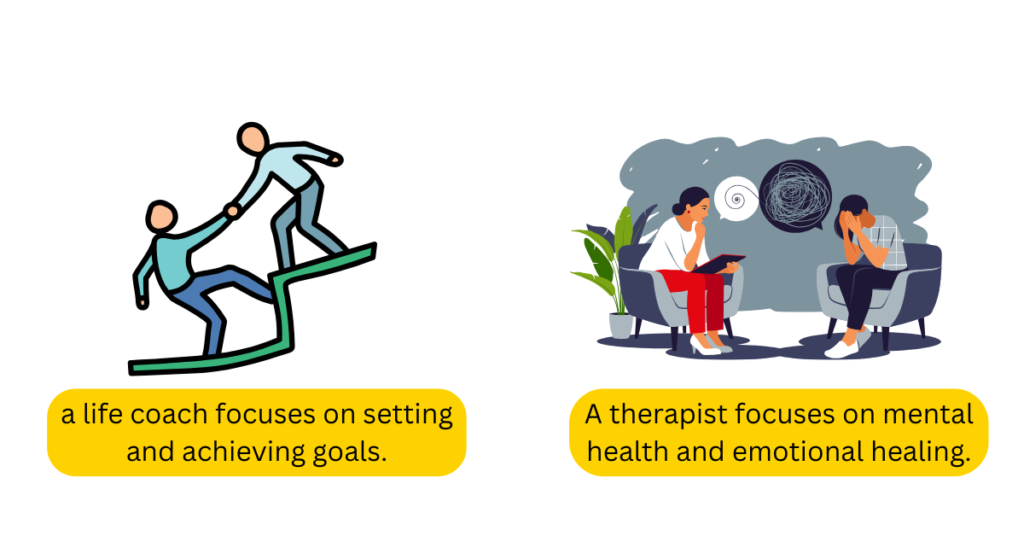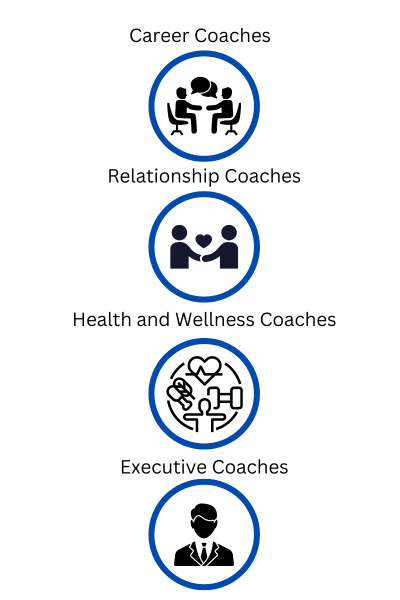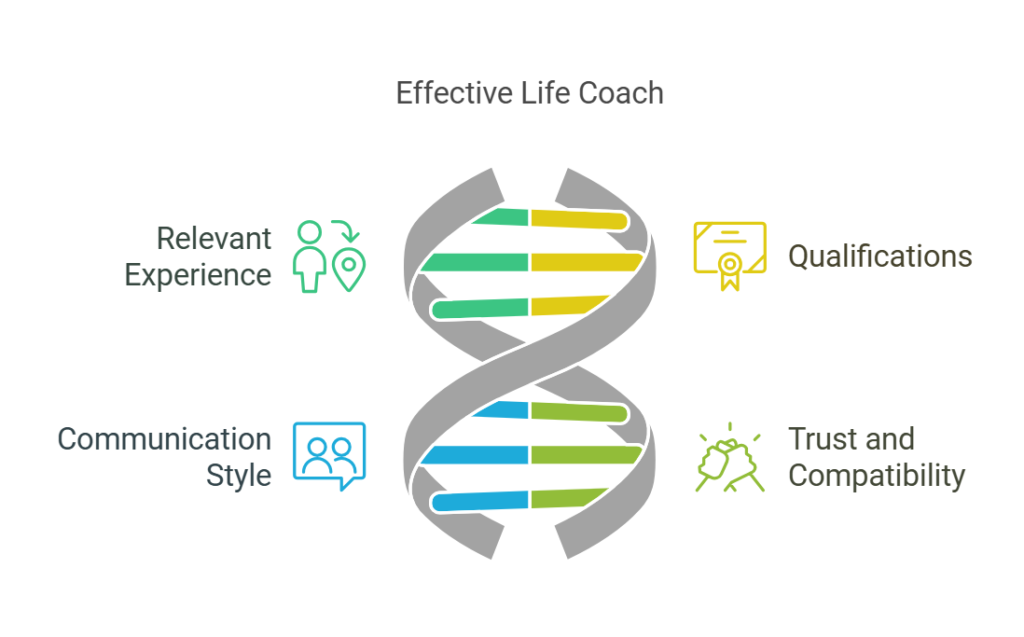Feeling stuck in your career or struggling to balance personal and professional life is common. You’ve tried setting goals or reading self-help books, but nothing seems to work. That’s where life coach expectations comes in a personalized way to unlock your potential and achieve meaningful progress.
With life coaching growing into a billion-dollar industry, more people are turning to coaches to overcome challenges and set clear goals. Whether it’s for personal growth or professional development, life coaching is providing individuals with the clarity and support they need.
In this article, we’ll explore what life coaching is, why it’s so popular, and how it can help you achieve your goals. You’ll learn what to expect from sessions, the benefits of working with a coach, and how to choose the right one for your needs.
What is a Life Coach Expectations?
So, what is the job of a life coach? A life coach is like a guide on a journey, helping you find clarity and focus when you’re unsure of the path ahead. Unlike self-help books that offer general advice, a life coach works one-on-one with you, providing personalized guidance based on your specific goals and challenges. They help you create a plan, hold you accountable, and ensure you stay on track.
Think of a life coach as a partner who walks beside you, offering encouragement when you hit obstacles and pushing you to achieve more than you thought possible. Whether you’re looking to improve your career, relationships, or personal growth, a life coach provides ongoing support tailored to your unique journey. While self-help materials offer broad ideas, a life coach keeps you focused on actionable steps that drive real progress.
If you’re ready to take control of your goals and need someone to help steer the course, working with a life coach might be the game-changer you’ve been looking for.
How a Life Coach Helps You Achieve Your Goals
A life coach helps you turn dreams into achievable goals by breaking down vague aspirations into clear, actionable steps. Imagine you want to switch careers but don’t know where to start. A life coach works with you to define exactly what you want and creates a plan to get there.
Accountability is another key part of the process. Without someone checking in, it’s easy to drift from your goals. A coach keeps you on track with regular progress reviews, ensuring any obstacles are swiftly addressed.
Life coaches also keep you motivated when things get tough. If self-doubt creeps in, they offer encouragement and guidance to push through. They’re like a guide on a difficult trail, reminding you that each step forward is progress.
One of the most powerful ways a coach helps is by addressing limiting beliefs those nagging thoughts that make you doubt your abilities. A coach helps you shift your mindset, turning hesitation into confidence and helping you grow personally and professionally.
Life Coaching vs. Therapy
While both life coaching and therapy aim to improve your well-being, they differ in focus. Life coaching is like a compass, helping you move forward by setting and achieving future goals. It’s action-oriented, designed to push you toward personal growth and success. Therapy, on the other hand, dives into your past, helping you heal from trauma or address mental health challenges. It’s more focused on emotional healing and resolving deeper issues.
Think of it this way: if you’re looking to break free from limiting beliefs, improve your career, or set clearer goals, life coaching helps map the way. But if you’re struggling with past trauma or mental health concerns, therapy provides the emotional tools to heal and move forward.
Both offer value, but they serve different needs. If your focus is on future growth, exploring life coaching could be the right next step. Ready to make progress? Discover how coaching can help you achieve your goals.

Five Benefits of Life Coaching
Life coaching offers a range of benefits, each designed to help you make meaningful progress toward your personal and professional goals.
Clarity and Focus
In the whirlwind of daily life, it’s easy to lose sight of what really matters. A life coach helps you cut through the noise and clarify your true priorities. It’s like cleaning a foggy window; suddenly, you can see where you’re going. By defining what’s important, a coach ensures you’re focused on goals that align with your values, making progress more purposeful.
Building Confidence
Self-doubt is often the biggest hurdle to success. Life coaches work to boost your confidence by helping you understand your strengths and areas for growth. With regular encouragement and reflection, you begin to trust your abilities, much like a muscle growing stronger with use. Confidence becomes the fuel that keeps you moving forward, even in the face of challenges.
Structured Progress
Big dreams can feel overwhelming, but life coaching breaks them down into manageable steps. Coaches help you create action plans that make progress feel more attainable. turning what once seemed impossible into a series of achievable milestones. It’s like building a house brick by brick, the structure takes shape. This structure not only keeps you motivated but also provides clear measures of success.
Accountability and Motivation
We all know how easy it is to set goals, only to let them slip away. A life coach holds you accountable, checking in regularly to ensure you’re making progress. When obstacles arise, they’re there to help you adjust your course. Think of them as your co-pilot, keeping you on track and motivated, no matter how turbulent the journey gets.
Improved Work-Life Balance
In today’s fast-paced world, finding balance between work and personal life can feel impossible. Life coaches help you develop strategies to manage your time, set boundaries, and prioritize self-care. With their support, you can avoid burnout and create a more fulfilling, balanced lifestyle one where both work and personal well-being thrive.
If you’re ready to unlock your potential and experience these benefits firsthand, consider exploring life coaching. It could be the key to making lasting, positive changes in your life.
Common Misconceptions About Life Coaching
Life coaching, though increasingly popular, is often misunderstood. Let’s clear up some common myths that may be holding you back from exploring its benefits.
Life Coaching is Only for Career Development
Many believe that life coaching is solely focused on career growth, but that’s only one aspect. Life coaching goes beyond the office and can help with personal development, improving relationships, building confidence, or even finding a better work-life balance. Whether you want to advance in your career or achieve more peace in your personal life, a life coach helps with the whole picture, not just one slice of it.
Life Coaching is Expensive
At first glance, coaching might seem like a luxury, but consider it an investment in long-term growth. Like upgrading your health with a gym membership, investing in life coaching helps you achieve goals that might otherwise remain out of reach. By focusing on lasting changes, from professional success to personal well-being, the value you gain often outweighs the cost. Think of it as planting seeds for future success.
Life Coaching Guarantees Quick Fixes
Some expect life coaching to offer quick solutions, but real change takes time and effort. A life coach isn’t there to hand out magic answers; they’re there to guide you through the process of self-discovery and growth. Progress comes with consistent effort, much like any long-term goal. A coach helps you navigate the journey with patience, not shortcuts.
Ready to experience the true value of life coaching and see how it can impact both your personal and professional life? Explore our coaching services and start building a brighter future today!
Types of Life Coaches
What does a life coach do exactly? Life coaches come in different specialties, each focusing on specific areas of personal or professional development. Choosing the right coach depends on where you need the most guidance.

Career Coaches
How a life coach can help your career? If you’re at a crossroads in your career or looking to advance, a career coach can be your guide. They help you navigate career transitions, develop new skills, or prepare for leadership roles. Think of them as your personal GPS, helping you find the best route to professional success.
Relationship Coaches
Relationships, whether personal or professional, can be tricky to manage. A relationship coach helps you improve communication, resolve conflicts, and build stronger connections. Whether you’re working on your marriage or looking to enhance workplace dynamics, these coaches provide the tools for healthier, more fulfilling relationships.
Health and Wellness Coaches
For those focused on physical and mental well-being, a health and wellness coach is the perfect fit. These coaches assist in creating healthier lifestyles, whether that means managing stress, improving fitness, or finding balance. It’s like having a personal trainer for both your body and mind, keeping you motivated and accountable for your health goals.
Executive Coaches
Designed for business leaders, executive coaches focus on developing leadership and management skills. They offer insights on decision-making, team management, and how to lead with confidence. If you’re looking to sharpen your leadership edge and steer your company toward growth, an executive coach can help elevate your leadership game.
How to Choose the Right Life Coach
Choosing the right life coach can make all the difference in your journey toward personal and professional growth. Here are some key steps to ensure you find the perfect fit.
Identify Your Goals
Before you start your search, it’s important to be clear about what you want to achieve. Are you seeking career guidance, improving relationships, or looking to boost your overall well-being? Knowing your goals will help you narrow down the type of coach that aligns with your needs. Think of it like setting a destination without knowing where you’re headed, it’s hard to find the right guide.
Look for Specialization
Just like you wouldn’t go to a general practitioner for a specific medical issue, finding a coach who specializes in your area of need is crucial. If you’re focused on career transitions, a career coach would be ideal. If you’re working on improving your health, a wellness coach is the way to go. Specialization ensures that the coach has the relevant experience and tools to help you achieve your specific goals.
Consider Personality and Compatibility
Coaching is a deeply personal process, and working with someone whose style resonates with you is essential. Some coaches are more direct, while others take a softer, more reflective approach. Think about what type of guidance motivates you do you prefer someone who challenges you head-on, or do you thrive with gentle encouragement? Scheduling an initial consultation can give you a feel for the coach’s personality and how well you might work together.
Ready to find the coach who will guide you toward your goals? Explore our coaching services and start your journey toward success today!
What to Expect from a Life Coaching Session
Life coaching is a highly personalized experience designed to help you reach your full potential. Each session is an opportunity to gain clarity, set goals, and move forward with confidence. Here’s what you can expect from a typical life coaching session:
Initial Discovery and Goal Setting
Every coaching journey begins with getting to know you.
- Understanding Your Needs: In the first session, your coach will spend time asking questions to understand your challenges, aspirations, and what’s holding you back. It’s a bit like laying out the map before starting the journey.
- Clarifying Your Goals: You’ll work together to clearly define your short- and long-term goals. Whether it’s career growth, personal development, or building better relationships, the goal-setting process provides a sense of direction and purpose.
Example: Imagine you’re feeling unfulfilled in your job but unsure of your next step. A coach helps break this down, guiding you to pinpoint whether it’s a lack of passion, a need for new skills, or something else entirely.
Creating an Action Plan
Once your goals are in place, the coach helps you create a practical roadmap.
- Breaking Down Big Goals: Large, overwhelming goals are broken into smaller, actionable steps. This makes the path to success clearer and more manageable.
- Defining Milestones: These smaller steps are set as milestones to track your progress. Each milestone brings you closer to achieving your ultimate goal.
Example: If your goal is to switch careers, a coach may guide you through steps like updating your resume, networking, and building new skills, all within a realistic timeframe.
Regular Check-Ins and Accountability
Life coaching thrives on accountability.
- Tracking Progress: Your coach will regularly check in on your progress, making sure you’re staying on course. These check-ins are designed to keep you motivated and ensure you’re moving toward your goals.
- Adjusting the Plan: Sometimes, life throws curveballs, and your original plan might need adjustments. A life coach helps you recalibrate without losing sight of your end goals.
Think of your coach as your co-pilot, guiding you when the flight path gets bumpy and helping you adjust course without losing your way.
Overcoming Obstacles and Limiting Beliefs
Challenges are inevitable, but with a life coach, you don’t face them alone.
- Tackling Mental Barriers: If you struggle with self-doubt or limiting beliefs, a coach will help you shift your mindset. This process is about identifying what’s holding you back and reworking how you approach challenges.
- Building Confidence: Over time, you’ll develop a more positive outlook, building the confidence you need to tackle both personal and professional hurdles.
Encouragement and Motivation
Life coaching isn’t just about strategies; it’s also about keeping you motivated.
- Celebrating Wins: Coaches help you recognize and celebrate the small victories, which are critical for maintaining momentum.
- Support During Setbacks: When things don’t go as planned, your coach offers support, helping you stay focused and motivated to push through tough times.
Reflection and Growth
At the end of each session, reflection is key.
- Reviewing Progress: You’ll reflect on what’s working and what isn’t. This helps you learn from each session and build momentum.
- Continuous Growth: With every session, you gain deeper insight into yourself and develop skills that will serve you long after the coaching relationship ends.
Key Qualities of an Effective Life Coach

Finding the right life coach is crucial to ensuring your personal and professional growth journey is successful. Here are the key qualities to look for:
Relevant Experience
It’s important to choose a life coach who has experience in the area you want to improve. Whether you’re focusing on career advancement, personal development, or relationship building, a coach with specific expertise in your field can offer more targeted advice and guidance. Just like you wouldn’t hire a swimming instructor to teach you how to ski, the right coach needs to understand your unique goals and challenges.
Qualifications
Certifications and training matter because they demonstrate that a coach has undergone proper education and practice. Look for life coaches who have completed accredited programs and hold certifications from recognized institutions. A certified coach is equipped with proven methods and tools to guide you more effectively. It’s similar to choosing a doctor; you want someone who has the credentials and skills to help you succeed.
Communication Style
The way a coach communicates with you can make all the difference. Some people thrive with direct, no-nonsense feedback, while others need a more empathetic, supportive approach. Finding a coach whose communication style aligns with your preferences ensures that you’ll feel comfortable and motivated throughout the process. It’s like finding the right workout routine some thrive with intense training, while others prefer a steady, supportive approach.
Trust and Compatibility
A strong coach-client relationship is built on trust and mutual respect. You need to feel comfortable being open and honest with your coach, and they should provide a safe, judgment-free space for you to grow. Compatibility ensures that the relationship is productive, and you can progress without hesitation. After all, coaching is a partnership, and the better the connection, the more impactful the results.
Finding the right life coach is about more than just qualifications; it’s about experience, communication, and building a trusting relationship. If you’re ready to find the right coach to help you unlock your potential, explore our coaching services today!
Conclusion
Investing in life coaching can accelerate your personal and professional growth. A life coach provides a clear path to success, offering tailored strategies, support, and accountability. Whether you’re aiming for career advancement, better work-life balance, or personal development, a coach helps break down challenges into achievable goals.
By finding a coach who aligns with your values and specific needs, you unlock new potential and make consistent progress. If you’re ready to make lasting changes, consider working with a life coach because the right guidance can help you unlock your brightest future.
FAQ
How does a life coach help with personal development?
A life coach helps by guiding you through self-discovery, setting clear goals, and overcoming obstacles. They provide tailored support to build confidence, improve habits, and achieve a more balanced, fulfilling life. With regular accountability and feedback, coaches help ensure steady personal growth.
Can a life coach assist with career goals?
Yes, a life coach can assist with career goals by helping you identify strengths, explore new opportunities, and develop strategies for career advancement. They provide clarity for career transitions and guide you in building skills to achieve both short- and long-term professional success.
What techniques do life coaches use to help clients achieve their goals?
Life coaches use techniques like goal-setting, action planning, and accountability tracking. They also help clients overcome limiting beliefs and build confidence through regular feedback, encouragement, and structured progress reviews, ensuring measurable advancement toward goals.
How do I choose the right life coach?
To choose the right life coach, identify your specific goals and look for a coach with relevant experience. Consider their qualifications, communication style, and how comfortable you feel working with them. Building trust and compatibility is crucial for a successful coaching relationship.
What is the purpose of a life coach?
The purpose of a life coach is to guide individuals in achieving their personal and professional goals by providing clarity, support, and accountability. A life coach helps you identify your aspirations, break them down into actionable steps, and overcome obstacles that may be holding you back. They offer tailored strategies to foster growth, confidence, and lasting success.





